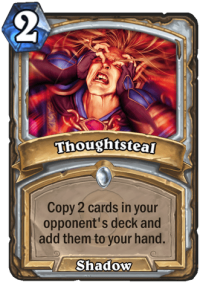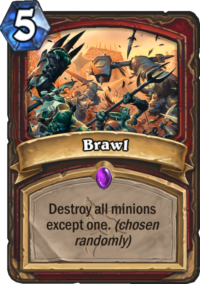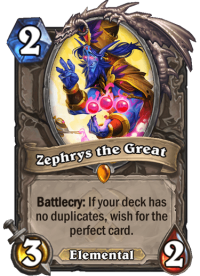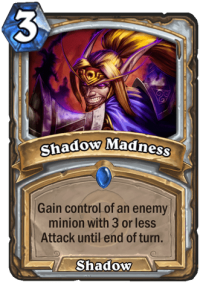We usually don’t write guides for a single card, but after seeing this suggestion, I thought that it’s a really good idea. Mindrender Illucia might be one of the most difficult cards to play correctly in the history of Hearthstone. Illucia is very strong when you time her right, but it’s also one of the cards that can actually work against you – it’s not uncommon for players to lose the game because of opponent got more from her than they did.
Of course, it’s impossible to cover every single situation in which you should drop her, the guide needs to be more generic. One of the most important skills when it comes to Illucia is meta knowledge – you need to understand your opponent’s win rate, what cards they might be holding at any given time and so on. If you do, you should be able to apply one of those more generic “scenarios” and hopefully drop her at the perfect moment!
Scenario #1 – When You Have Cards Your Opponent Can’t Use Anyway
Sometimes you just want to play Illucia on curve. Well, maybe not literally “on curve”, sometimes it might be Turn 4, Turn 5, but I’m talking about those early/mid game scenarios. You know, when you get a hand full of late game / situational cards that aren’t useful at the time.

For this switch to be successful, you want to make sure that there’s nothing your opponent wants to play in your hand. For example, if it’s on Turn 4, then you don’t want to have a Turn 5 play. You might still have a small minion that you don’t mind your opponent “stealing”, situational removal that are useless at the time (e.g. Shadow Word: Death), cards that add more value to the hand (e.g. Thoughtsteal – if your opponent plays it, for the most part it’s okay because they just add more value to your hand – unless they get 2 cards that they can play immediately). And, of course, expensive cards that they simply can’t play.
But why would you want to do it? Well, the answer is simple – you’re basically forcing your opponent to skip their turn and miss a card draw (because they draw a card into “your” hand instead). Against most of the decks, you’re the one who wants to play a slow game, so. Additionally, you might steal something cheap from their hand. If they’re still holding a Coin – you get rid of that. Against Druid, you might use their Lightning Bloom / Innervate. Against Rogue, you might waste a Secret Passage, Backstab, Shadowstep (one extra note is that you Illucia twice on the same turn, you just go back to your original hand and then they switch back twice, so in the end your opponent doesn’t get to play your cards at all) etc. Against Aggro you might play a 1-drop or two, maybe some small removal, burn card, basically play whatever you can. It doesn’t really matter, because that wasn’t the main goal.
Scenario #2 – Get Rid of Specific Cards
It’s probably the best use for Illucia, but also the most difficult one, because it requires excellent timing. You play it too early – they might not have the card you want to get rid of yet. If you play it too late – they might already play that card. But there’s no easy answer as to when you should play her exactly, it’s really up to the matchup, how much your opponent has drawn already and so on. This is also the part where you can use your meta knowledge – after the first few cards, you should know more or less what build your opponent is playing, what is their win condition and so on.

This works best against Combo decks – you want to play Illucia, waste one of their vital combo cards and then switch back like nothing happened. The truth is that we don’t have a lot of combo decks in the meta for a while now. The most popular would be Illusion / Turtle Mage, but in this case Tortollan Pilgrim is really the only card they need to win, and you can’t steal it, because it’s too expensive. A better example would be Malygos Druid. Against that deck, there’s a lot of cards you can get rid of. Ideally, you might be able to drop Forest Warden Omu and a cheap spell to refresh your mana crystals and hopefully steal more. Ideally you now drop Malygos and ruin their win condition, but Germination is also fine. And if he holds neither, you can always play 0 mana Moonfires, which will leave your opponent with less burst. And then there’s Swipe – even less burst damage for your opponent.
But even other, non-Combo decks are susceptible to this kind of Illucia play. Nearly every deck has some key cards that they really don’t want you to get rid of. It might be Sorcerer's Apprentice against Tempo Mage, Wrenchcalibur / Upgrade! against Bomb Warrior, Zephrys the Great against Highlander decks (or – even better – drop her after they’ve played Dragonqueen Alexstrasza for those sweet 1 mana Dragons), burn cards against Aggro and so on.
If you don’t know each matchup well enough, a rule of thumb would be playing Illucia after their big draw turn / when they have a lot of cards in their hand. This way there’s a high chance that they’re holding something useful. But after playing each matchup a couple of times, you should more or less know when they draw their key cards on average.
Scenario #3 – Value Tool
Of course, ideally you want to snatch some specific cards that will either make you win more easily, or cards that will make your opponent’s game harder. But that won’t always happen – maybe you drew your Illucia too late and they’ve already played their key cards, maybe they don’t actually play any key cards that are worth stealing, or maybe you mistimed her. No matter – the card is not yet useless, as you can use her simply as a value tool.
You usually can’t play her just like that and need some set up. You can, for example, make higher tempo plays for a couple of turns in a row in order to not only push your opponent’s life total, but also get rid of cards in your hand. And when you have nothing worth stealing anymore, you play Illucia and then spend 7 mana playing stuff from your opponent’s hand. Your opponent won’t really steal anything because there’s nothing to steal (not counting the topdeck, but it’s not something you can play around) and you possibly snatch some solid stuff from their hand. Because you were playing for the tempo in the previous turns, there’s a solid chance that they aren’t holding many removals, but proactive cards that you will gladly take from them.
There’s nothing stopping you from combining this scenario with a previous one – if you’re running out of value AND you think that your opponent might be holding onto a specific, key card – that’s double the reason to drop Illucia. But just playing 2-3 cards from your opponent’s hand will not only give you extra value, but also remove that value from his hand, making it a pretty solid swing.
Scenario #4 – Denial

Sometimes you might want to get rid of a specific card in your opponent’s hand, and other times… you want them to not do whatever they were supposed to do that turn at all by giving them your hand even if they don’t want it. In this case, Illucia is not played to steal something from your opponent’s hand. I mean, if you do it, that’s great, but it’s not the main point. Here, the goal is to deny them from playing anything from their hand.
The best example would be you creating a solid board (e.g. playing two big Dragons from Dragonqueen) and dropping Illucia when you have no AoE removal in your hand. That play is meant to prevent your opponent from clearing the board. You might be playing a Warrior holding a Brawl, but it doesn’t matter, because the hand you give them has no board clear. So unless they topdeck one from your deck, they have no way to get rid of it and possibly just die.
Another interesting case might be preventing lethal from your opponent. If you play against Aggro, you’re on low health etc. and they might be holding lethal – you deny it from them by dropping Illucia. Not only it buys you one more turn (so you can play an extra Hero Power, have another chance to draw healing etc.), but you also might play a burn card from your opponent’s hand. Yes, they will play something from your hand, but it’s better than dying. In a similar vein, if you’re threatening lethal yourself, you can switch hands to deny any potential healing from your opponent.
When to NOT play Illucia
While “when you should play Illucia” is the most common thought, this one is nearly as important. There are situations in which you absolutely DON’T want to play Illucia. Even when it feels like a right time because you might steal something, you also need to consider your own hand, board state etc. when thinking whether you should play her or not.

The most common example is giving your opponent one of YOUR most valuable cards. For example, if you’re holding Zephrys the Great in Highlander build, dropping Illucia is just silly. Your opponent will just play Zephrys and most likely get even more value – clear your board, drop a big threat or something similar. And most importantly, he will keep that Zephrys from you. Similarly, if you’re in a more grindy matchup, you don’t want to give up on your Galakrond, the Unspeakable. Giving it to your opponent might turn the tides of a longer game.
Another example is holding a board clear that works well against what you currently have. For example, if you have a Soul Mirror in your hand and a board that’s a great Soul Mirror target… don’t swap. Your opponent will just play it, get rid of a great card from your hand AND handle your board.

While it doesn’t happen often, and it should be absolutely obvious, but don’t swap hands when it can give your opponent lethal. While you do not run any direct burn cards, keep in mind cards such as Shadow Madness, Apotheosis or any randomly generated buffs like Inner Fire or Power Word: Feast. If you have a Taunt, a removal / Silence can also give your opponent lethal, so think twice before switching when you’re against Aggro or on low health.
To put it simply – don’t play her when the loss is higher than a potential gain. Sure, if you play against a Combo deck and you think that they might be holding a vital combo piece and you will win the game just by stealing it… most of the above scenarios (barring giving your opponent lethal) simply don’t matter. But unless the Illucia gives you A LOT of value or straight up wins you the game, try to avoid playing her at those times.
One more thing to remember is that your opponent will get your current hand AND a top deck. Sure, you can’t really play around that, but you should still take that into consideration. For example, if you have 5 cards left in your deck, and one of those 5 is Zephrys that will win your opponent a game… unless you REALLY need to do it, it might be a good idea to wait with the switch until you draw it.
Conclusion
As you can see, timing Illucia is not an easy task. If you aren’t experienced Priest player, you will definitely play her at a wrong time a few times. Usually it won’t lose you the game right away, but there are some cases in which you’re just giving your opponent lethal without even realizing. The card, like I’ve mentioned multiple times, also requires incredible meta knowledge – in order to use all her potential, you need to know what cards your opponent might be holding at a given time. Of course, it’s impossible to be 100% correct with hand reads, but if you don’t know your opponent’s deck list at all, then you have no idea what cards you want to take from them and when.
Those few guidelines above are just the basics – you need to explore from there and try to apply them to different matchups and situations like hand contents and board states. Still, remember that every Illucia you play brings you closer to perfection – and possibly another opponent closer to madness.

The most high skill cap card “period” in HS; still sees competitivie play in Barrens meta and tournaments but I never won a match with her aid! Well maybe only 1/3 games could swing back or ruin opponent gameplan. Do you think it’s still a good craft for a Priest main?
Thanks – after reading the article I’ve crafted the card!
Thanks for the article. Interesting read and useful tips 🙂